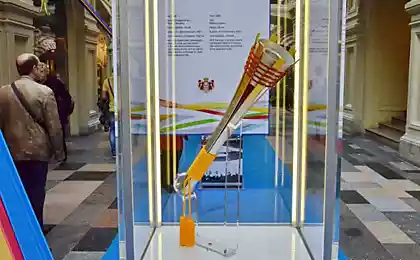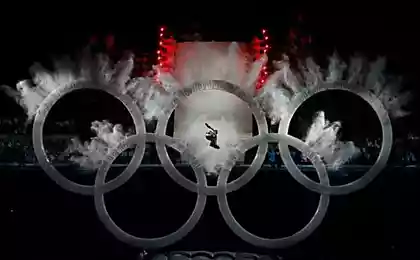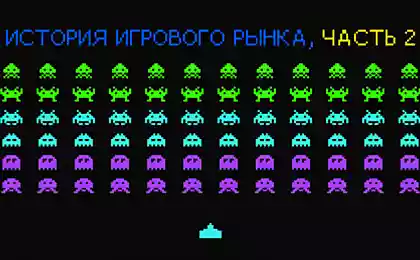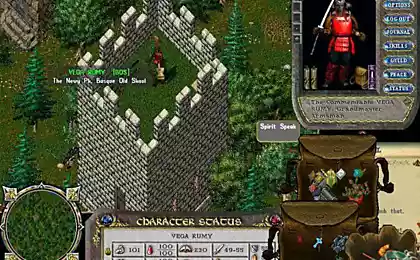736
16 of the best games of our childhood
In the XXI century, the children quietly disappeared from the yard the big cities - they now play computer games or good manners spend time in a specially organized children's clubs. Together with the children vanished culture yard yard games and socialization (with all of its features). And if the kids can still be found at the sites under the care of relatives, the school is not visible almost. "Times" spring looks around the deserted courtyards and remembers missing games, which are largely made us adults, what we became.
Source.

Rezinochki
How to play. The main attribute of this game for girls - underwear elastic. The ideal number of players - 3-4. Each participant performs a jump figures and combinations at different heights: from the level of the ankle (jump "first") to the level of the neck (jumping "six"). Jumping rezinochku stretched at the hips, wearing a mysterious name "pozhepe." Once the jumper is mistaken in its place rises another participant, and erred girl puts on a rubber band. If four players, the pair are reversed when both players of a pair of serially mistakes.
What develops: the vestibular apparatus, coordination, attention. Teaches train, win, lose with dignity, jump higher and be friends with all the girls, even if at the moment they are rivals.
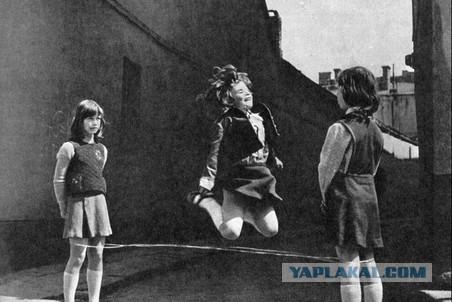
Classics
How to play. Wanted crayons, asphalt playground and a stone (or puck). You draw a shallow cells with numbers in sequence, and you can even jump alone. The main thing - to get the stone in the cage doprygat to her on one or two feet and go back the same way. The most successful player is the one who manages to go all the way up to tens of edinichki. The number of players in the "classics" can be any.
What develops: agility, accuracy, ability to concentrate and knowledge of numbers, if the players really kids.
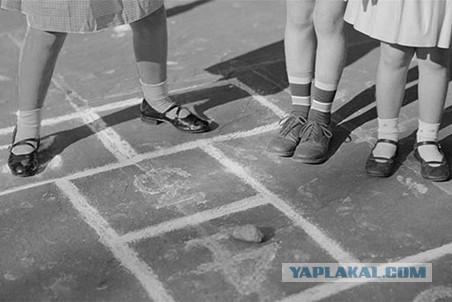
Boyars
How to play. Members of the ancient Russian folk-games are divided into two equal teams and are opposite each other in rows, holding hands, at a distance of 10-15 m. The teams move forward, uttering a long queue of rechovku "Boyars, and we come to you, dear and we will come to you ... "The dialogue ends with the words:" Boyars, open the gates, give us a bride forever. " Those who choose a bride must then run and break the chain of the enemy. If the attempt is successful, the player returns to his team, if not - is another. Next game starts losing team. The goal - to collect the team as much as possible participants.
What develops: the ability to be a team and to win in a situation of "one against all».
From myself: We have a kindergarten in this game called "irons uninhibited» ...

Quiet steady wins the race - Stop
How to play. The task of driving - be back to the participants at the finish line (the greater the distance between the ducting and the participants, the better) and loudly say, "Hush steady wins the race - stop." While The leader says (and it can do it at any rate), the participants are trying to get away as far as possible towards the finish line. Once The leader silenced, you need to freeze in place. Anyone who does not have time to stop or did random movement, out of the game. The one who gets to the finish line first and touches of driving.
What develops: coordination, the ability to run fast and to respond to changing circumstances.
Telltales
How to play. Participants walk away from conductive (this game - kind of salokya). The leader is catching up with the player and it touches - osalivaet. Osalenny puts his hands, and any other participant may run up, touch him and "help out." The task of driving - does not stray too far from the osalennogo and not to allow him one single step. Summer version telltales - run with "bryzgalki" and showering each other with water from a leaky bottle. Typically, five minutes after the start of the game all wet, but very funny.
What develops: the ability to smartly run, think quickly and to enjoy life in full.
From myself, but perhaps the ability to enjoy life you need to develop, I mean children. They have this ability, IMHO, it is not necessary to take ...

Braving
How to play. Leading turns away from the players and says Counting:
Braving,
Sea waves two,
Sea waves three,
Marine figure stand still in place!
As he says, the participants randomly moving in any order, depicting the hands of wave motion. Once The leader silenced, you freeze in any figure. The leader is coming to one of the players and touches him. The player shows the figure in the movement, and The leader guesses what it is. The player whose figure was unable to guess, he becomes a driving.
What developed: imagination, spontaneity and artistry.
Cops and robbers
How to play. Players are divided into two teams - "Cossacks" and "thieves." Arrange on a play area. This may be a court, entrance, street, several yards. "Robbers" guessing the secret word. "The Cossacks" move aside so as not to see "bandits." "Rogues' escape, marking arrows on the pavement (the walls, curbs, trees, etc.), its direction of motion. Begins to run the group, and then run away in all directions, trying to confuse the arrows "Cossacks." The task of "Cossacks" - find the arrows "bandits." Each "bandit", "Cossack" results in "jail" and guard him, trying to ferret out the secret word, for example, by means of torture nettle. "The Cossacks" win, once they learn the secret word and find all the "bandits».
What develops: the basic skills of intelligence, the ability to navigate the terrain and did not take "their".
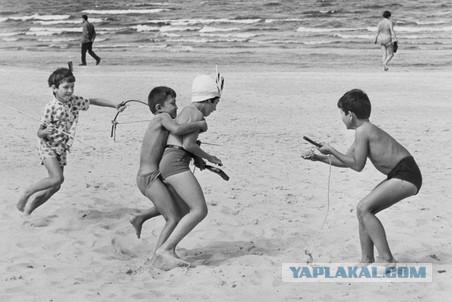
12 sticks
How to play. The game resembles the classic hide and seek. 12 small sticks are placed on the "arm" (for example, on a plate and put it under a stone), so that by stepping on a lever, could throw sticks. The task of driving - to collect sticks, put them on the arm, said with his eyes closed Counting and go in search of hidden players. Once The leader finds the player runs to the "arm" and breaks sticks, calling the name found. The player becomes the driving. If you found the time to get ahead and reach the conductive rods first, leading not changed.
What develops: the ability to competently and quickly run to hide in the essentials.
From myself there was something similar, called "siskin» ...

Bouncers
How to play. "Bouncers" - two players - stand on both sides of the site. The other players are the focus. The task of "bouncers" - throwing the ball to each other, to get into any of the "central" players. The player's task - to dodge the flying ball. Anyone who came in out of the game. Other participants can "save" the retired player, catching the ball in the air (the main condition - not off the ground, otherwise you take off too). When the command "central" players is a participant, he must dodge the ball as many times as his age. If he manages to do it all disposed return to their former places.
What develops: the ability to quickly dodge flying objects, think about the near and endure the pain.
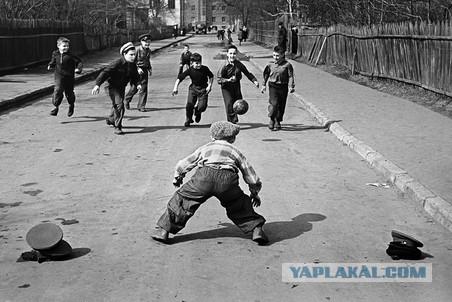
I know the names of 5
How to play. The first player takes the ball in his hands, says: "I know a girl's name," hitting the ball with one hand on the ground and calls the name. Then it continues with different variations: "I know a boy's name," "I know one color," "I know one animal", "I know a city." When all combinations are used, the player says the same rhymes, only this time at the expense of the two: "I know the name of the two girls" - and then in a circle. The game continues until ten. If, beating the ball, the player did not have time to name or hit the ball, the course moves on to another participant. When the ball, having passed through all the participants returned to the first player, he continues to play with the phrase, which was wrong. The winner is the one who first gets in this rechovke to ten.
What develops: multitasking, erudition, the ability to correct their mistakes and move on.
Edible-inedible
How to play. All players sit or stand in a row. The leader throws the ball to one of the participants and at the same time calling some object. If the subject of "edible", the player catches the ball. If not - discourages. The task of driving - to confuse the player, for example, in the chain of "apple-melon, carrots, potatoes," suddenly say: "Iron". If a player makes a mistake and "eats" "inedible", that itself becomes a driving. The faster The leader throws the ball and calls the object, the more exciting and fun to play.
What develops: a sense of humor, the ability to listen carefully and respond quickly.
Knife
How to play. Players represent the circle on the ground. Then take turns trying to get a knife in the defined territory of the enemy, and thus regain his ground as much as possible. Knife can throw including the shoulder, with the coup, nose and even the head. There are many versions of the game in the "knives" under various names, "earth", "city", "bench", "grandmother-Dedkov", "Tank Battle", "boats", "football", "Sea Battle." You can stick a knife into the earth, sand and even the wooden bench.
What develops: the ability to deal with machetes, care and caution.
From myself, knives mothers periodically selected ...
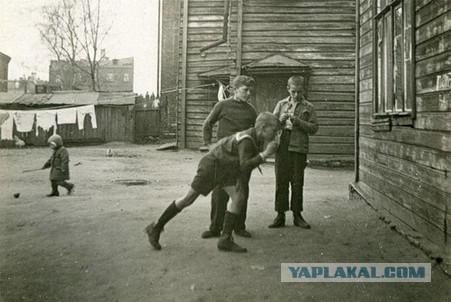
Ring-ring
How to play. Players sit in a row and placed palm boat. The leader holds in his hand or hands folded small object such as a coin, button, ring. In turn each player passes, putting in his "boat" and saying his rhyme: "I wear a wear-ring and someone to buy." The task of driving - quietly put "ring" one of the players and say, "Ring-ring, go out on the porch!" After that, the player who got the subject, jumps up and tries to run away. The task of the other participants - hold evader.
What develops: the ability to follow the manipulation of others, act quickly and decisively.
You go to the prom?
How to play. The leader says the rhyme:
And do not say no,
black and white do not call,
You go to the prom?
His task - to confuse the player. After rhymes The leader asks the player a variety of specific questions: what will go on what will go, what color will be a dress or pants, the groom's name, etc. The player's task - to answer the questions without using the word "yes", "no", "black", "white". The most interesting thing to mix simple and complex questions, change the rate of speech and intonation.
What develops: the ability to think outside the box, to monitor their own speech, to hold the attention and quickly find a way out of this situation.
I was born gardener
How to play. Each player chooses a name - the name of the flower and tells him "the gardener" -vodyaschemu and other players. The leader says Counting: "I was born a gardener, not a little angry, I'm tired of all the colors, except ..." and is called "name" (name of the flower), one of the players. There is a dialogue between the ducting and the player. The player says the name of one of the flower that is in the team. Member whose name sounded, must respond. The dialogue continues. The one who made a mistake, for example, did not respond to his name, the name of mixed colors - gives Fant (any of your thing). At the end of the game played forfeits. "Gardener" turns the thing to get and Steering ask: "What do the players?" "Gardener" assigns a task (to jump on one leg, poprisedat, sing, tell a poem, etc.) - the player to "work off" and takes his forfeit thing.
What develops memory, attention, courage and a willingness to answer for their actions.

Source:
Source.

Rezinochki
How to play. The main attribute of this game for girls - underwear elastic. The ideal number of players - 3-4. Each participant performs a jump figures and combinations at different heights: from the level of the ankle (jump "first") to the level of the neck (jumping "six"). Jumping rezinochku stretched at the hips, wearing a mysterious name "pozhepe." Once the jumper is mistaken in its place rises another participant, and erred girl puts on a rubber band. If four players, the pair are reversed when both players of a pair of serially mistakes.
What develops: the vestibular apparatus, coordination, attention. Teaches train, win, lose with dignity, jump higher and be friends with all the girls, even if at the moment they are rivals.

Classics
How to play. Wanted crayons, asphalt playground and a stone (or puck). You draw a shallow cells with numbers in sequence, and you can even jump alone. The main thing - to get the stone in the cage doprygat to her on one or two feet and go back the same way. The most successful player is the one who manages to go all the way up to tens of edinichki. The number of players in the "classics" can be any.
What develops: agility, accuracy, ability to concentrate and knowledge of numbers, if the players really kids.

Boyars
How to play. Members of the ancient Russian folk-games are divided into two equal teams and are opposite each other in rows, holding hands, at a distance of 10-15 m. The teams move forward, uttering a long queue of rechovku "Boyars, and we come to you, dear and we will come to you ... "The dialogue ends with the words:" Boyars, open the gates, give us a bride forever. " Those who choose a bride must then run and break the chain of the enemy. If the attempt is successful, the player returns to his team, if not - is another. Next game starts losing team. The goal - to collect the team as much as possible participants.
What develops: the ability to be a team and to win in a situation of "one against all».
From myself: We have a kindergarten in this game called "irons uninhibited» ...

Quiet steady wins the race - Stop
How to play. The task of driving - be back to the participants at the finish line (the greater the distance between the ducting and the participants, the better) and loudly say, "Hush steady wins the race - stop." While The leader says (and it can do it at any rate), the participants are trying to get away as far as possible towards the finish line. Once The leader silenced, you need to freeze in place. Anyone who does not have time to stop or did random movement, out of the game. The one who gets to the finish line first and touches of driving.
What develops: coordination, the ability to run fast and to respond to changing circumstances.
Telltales
How to play. Participants walk away from conductive (this game - kind of salokya). The leader is catching up with the player and it touches - osalivaet. Osalenny puts his hands, and any other participant may run up, touch him and "help out." The task of driving - does not stray too far from the osalennogo and not to allow him one single step. Summer version telltales - run with "bryzgalki" and showering each other with water from a leaky bottle. Typically, five minutes after the start of the game all wet, but very funny.
What develops: the ability to smartly run, think quickly and to enjoy life in full.
From myself, but perhaps the ability to enjoy life you need to develop, I mean children. They have this ability, IMHO, it is not necessary to take ...

Braving
How to play. Leading turns away from the players and says Counting:
Braving,
Sea waves two,
Sea waves three,
Marine figure stand still in place!
As he says, the participants randomly moving in any order, depicting the hands of wave motion. Once The leader silenced, you freeze in any figure. The leader is coming to one of the players and touches him. The player shows the figure in the movement, and The leader guesses what it is. The player whose figure was unable to guess, he becomes a driving.
What developed: imagination, spontaneity and artistry.
Cops and robbers
How to play. Players are divided into two teams - "Cossacks" and "thieves." Arrange on a play area. This may be a court, entrance, street, several yards. "Robbers" guessing the secret word. "The Cossacks" move aside so as not to see "bandits." "Rogues' escape, marking arrows on the pavement (the walls, curbs, trees, etc.), its direction of motion. Begins to run the group, and then run away in all directions, trying to confuse the arrows "Cossacks." The task of "Cossacks" - find the arrows "bandits." Each "bandit", "Cossack" results in "jail" and guard him, trying to ferret out the secret word, for example, by means of torture nettle. "The Cossacks" win, once they learn the secret word and find all the "bandits».
What develops: the basic skills of intelligence, the ability to navigate the terrain and did not take "their".

12 sticks
How to play. The game resembles the classic hide and seek. 12 small sticks are placed on the "arm" (for example, on a plate and put it under a stone), so that by stepping on a lever, could throw sticks. The task of driving - to collect sticks, put them on the arm, said with his eyes closed Counting and go in search of hidden players. Once The leader finds the player runs to the "arm" and breaks sticks, calling the name found. The player becomes the driving. If you found the time to get ahead and reach the conductive rods first, leading not changed.
What develops: the ability to competently and quickly run to hide in the essentials.
From myself there was something similar, called "siskin» ...

Bouncers
How to play. "Bouncers" - two players - stand on both sides of the site. The other players are the focus. The task of "bouncers" - throwing the ball to each other, to get into any of the "central" players. The player's task - to dodge the flying ball. Anyone who came in out of the game. Other participants can "save" the retired player, catching the ball in the air (the main condition - not off the ground, otherwise you take off too). When the command "central" players is a participant, he must dodge the ball as many times as his age. If he manages to do it all disposed return to their former places.
What develops: the ability to quickly dodge flying objects, think about the near and endure the pain.

I know the names of 5
How to play. The first player takes the ball in his hands, says: "I know a girl's name," hitting the ball with one hand on the ground and calls the name. Then it continues with different variations: "I know a boy's name," "I know one color," "I know one animal", "I know a city." When all combinations are used, the player says the same rhymes, only this time at the expense of the two: "I know the name of the two girls" - and then in a circle. The game continues until ten. If, beating the ball, the player did not have time to name or hit the ball, the course moves on to another participant. When the ball, having passed through all the participants returned to the first player, he continues to play with the phrase, which was wrong. The winner is the one who first gets in this rechovke to ten.
What develops: multitasking, erudition, the ability to correct their mistakes and move on.
Edible-inedible
How to play. All players sit or stand in a row. The leader throws the ball to one of the participants and at the same time calling some object. If the subject of "edible", the player catches the ball. If not - discourages. The task of driving - to confuse the player, for example, in the chain of "apple-melon, carrots, potatoes," suddenly say: "Iron". If a player makes a mistake and "eats" "inedible", that itself becomes a driving. The faster The leader throws the ball and calls the object, the more exciting and fun to play.
What develops: a sense of humor, the ability to listen carefully and respond quickly.
Knife
How to play. Players represent the circle on the ground. Then take turns trying to get a knife in the defined territory of the enemy, and thus regain his ground as much as possible. Knife can throw including the shoulder, with the coup, nose and even the head. There are many versions of the game in the "knives" under various names, "earth", "city", "bench", "grandmother-Dedkov", "Tank Battle", "boats", "football", "Sea Battle." You can stick a knife into the earth, sand and even the wooden bench.
What develops: the ability to deal with machetes, care and caution.
From myself, knives mothers periodically selected ...

Ring-ring
How to play. Players sit in a row and placed palm boat. The leader holds in his hand or hands folded small object such as a coin, button, ring. In turn each player passes, putting in his "boat" and saying his rhyme: "I wear a wear-ring and someone to buy." The task of driving - quietly put "ring" one of the players and say, "Ring-ring, go out on the porch!" After that, the player who got the subject, jumps up and tries to run away. The task of the other participants - hold evader.
What develops: the ability to follow the manipulation of others, act quickly and decisively.
You go to the prom?
How to play. The leader says the rhyme:
And do not say no,
black and white do not call,
You go to the prom?
His task - to confuse the player. After rhymes The leader asks the player a variety of specific questions: what will go on what will go, what color will be a dress or pants, the groom's name, etc. The player's task - to answer the questions without using the word "yes", "no", "black", "white". The most interesting thing to mix simple and complex questions, change the rate of speech and intonation.
What develops: the ability to think outside the box, to monitor their own speech, to hold the attention and quickly find a way out of this situation.
I was born gardener
How to play. Each player chooses a name - the name of the flower and tells him "the gardener" -vodyaschemu and other players. The leader says Counting: "I was born a gardener, not a little angry, I'm tired of all the colors, except ..." and is called "name" (name of the flower), one of the players. There is a dialogue between the ducting and the player. The player says the name of one of the flower that is in the team. Member whose name sounded, must respond. The dialogue continues. The one who made a mistake, for example, did not respond to his name, the name of mixed colors - gives Fant (any of your thing). At the end of the game played forfeits. "Gardener" turns the thing to get and Steering ask: "What do the players?" "Gardener" assigns a task (to jump on one leg, poprisedat, sing, tell a poem, etc.) - the player to "work off" and takes his forfeit thing.
What develops memory, attention, courage and a willingness to answer for their actions.

Source:








